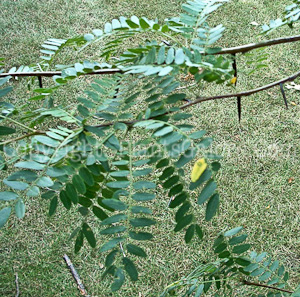|
|
 |
Gleditsia
triacanthos |
 |
Honey Locust |
 |
 |
  |
|
 |
Pennsylvania to Texas -
United States |
|
 |
|
 |
 |
Upright, with a graceful, open,
vase-shaped crown and branches growing somewhat
horizontally. |
 |
Very variable in height,
commonly 30-70 feet (up to 100 feet plus) tall with a spread up to 60-70 feet |
 |
Plants are
polygamo-dioecious.
Flowers are greenish, fragrant, borne in axillary racemes in June, not showy. |
 |
|
 |
Leaves are alternate, pinnate
or bipinnately compound pinnate leaves having
20-30 leaflets, each being ⅓-1˝ inches
long bi-pinnate leaves having 50-100 leaflets,
each being ⅓-1 inch long, very finely
serrate. |
 |
Fall color is a clear yellow. |
 |
Buds are very tiny, difficult
to see, clustered at the nodes. |
 |
Bark is grayish-brown, divided
into large, flat plates, separated by deep
ridges. Stems are zig-zag, with very large,
branched thorns |
 |
Fruit is a reddish-brown to
brown pod, 7-18 inches long, 1 inch wide,
ripening in September-October and persisting all
winter. |
 |
|
 |
|
|
 |
 |
- var.
inermis - has the same general
characteristics as the species except that
the thorns are missing.
- 'Moraine' - patented in 1949.
- 'Rubylace' - thornless dark purplish-red growth
which darkens to bronze-green as the leaves
mature.
- 'Sieler' - thornless large wide spreading tree
nearly seedless.
- 'Stephens' - thornless and seedless.
- 'Skyline' - thornless and branches emerge from the
trunk at a wide angle but quickly turning
upward, to give a pyramidal shape to the
tree.
- 'Sunburst' - thornless with bright golden-yellow color
of young leaves, relatively slow, compact
habit of growth
|
 |
 |
Named for
Johann Gleditsch |
|
 |

